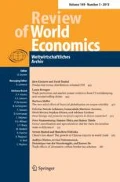Abstract
Foreign firms face punitive duties if they do not cooperate with the US Department of Commerce (DOC) in antidumping procedures. For example, 37% of all foreign firms involved in antidumping investigations in the US faced “facts available” margins for the 1995–2002 period, with average antidumping duties of 31% for cooperating foreign firms, compared to 87% for those who did not cooperate. The existing literature has focused on how DOC discretion has led to foreign firm non-cooperation. This paper instead examines individual foreign firm’s decisions about whether to cooperate during this same period. We find evidence that non-cooperation is consistent with a model of foreign firms rationally choosing not to cooperate, rather than solely as a result of investigating authority bias against imports.
Similar content being viewed by others
Notes
Moore (2006). Prior to 1995, the US deemed these procedures “best-information-available.” Subsequent to reform associated with the Uruguay Round of multilateral trade negotiations, US administrators changed the designation to “facts-available.”.
Source: 64 Federal Register, page 14863, March 29, 1999.
Foreign firms not investigated individually are subject to an “all others” rate, which is a weighted average of dumping margins for producers in the particular country under investigation.
Note this expression assumes that foreign profits (net of compliance costs) will be the same under cooperation or non-cooperation if the foreign firm faces no tariffs after winning the antidumping petition.
Bruce Blonigen kindly provided much of this data for the pre-2000 period. Data about petitioning firm allegations about dumping margins as well as information for subsequent years were collected from the DOC’s antidumping website (http://ia.ita.doc.gov/).
We cannot estimate a Mexico specific effect because Mexican firms always cooperated in the data set used in the empirical analysis.
Export data come from the UN COMTRADE database (http://comtrade.un.org) through the World Bank WITS system (http://wits.worldbank.org). For each investigation, exports to the US and to the world were obtained for HS 6-digit sectors in the subject countries in the year prior to the year of initiation. The non-US market share is then calculated using these values.
We treat this as an exogenous explanatory variable. One might argue that the decision of whether or not to cooperate at the DOC stage might affect the latter ITC decision. Research by Moore (1992) and others have shown that the ITC does not systematically consider the DOC stage outcome in its decision making process.
Recall that all firms from a particular country may receive the highest alleged margin for firms in that country.
Despite the low significance level of “Underselling” we include it in the regression as the Amemiya-Lee-Newey minimum chi-square statistic for overidentification yields a test statistic of 0.154, which suggests that both instruments should be included in the first stage.
References
ADA (Antidumping Agreement) (1994). Agreement on implementation of article VI of the General Agreement on Tariffs and Trade. http://www.wto.org/english/docs_e/legal_e/final_e.htm, Accessed 20 May 2004.
Baldwin, R. E., & Moore, M. O. (1991). Administration of the unfair trade laws by the Department of Commerce: A political economy analysis. In R. Boltuck & R. Litan (Eds.), ‘Down in the dumps’—administration of US trade remedy law (pp. 253–280). Washington, DC: Brookings Institution.
Blonigen, B. (2006a). Evolving discretionary practices of US antidumping activity. Canadian Journal of Economics, 39(3), 874–900. doi:10.1111/j.1540-5982.2006.00374.x.
Blonigen, B. (2006b). Working the system: Firm learning and the antidumping process. European Journal of Political Economy, 22(3), 715–731. doi:10.1016/j.ejpoleco.2005.03.005.
Blonigen, B., & Prusa, Tom. (2003). Antidumping. In E. Kwan Choi & J. Harrigan (Eds.), Handbook of international trade (pp. 251–284). Cambridge: Blackwell Publishing.
Mastel, G. (1998). Antidumping laws and the US economy. Armonk, New York: M.E. Sharpe.
Moore, M. O. (1992). Rules or politics?: an empirical analysis of ITC antidumping decisions. Economic Inquiry, 30(3), 446–466.
Moore, M. O. (2005). ‘Facts available’ dumping allegations: When will foreign firms cooperate in antidumping petitions? European Journal of Political Economy, 21(1), 185–204. doi:10.1016/j.ejpoleco.2004.01.004.
Moore, M. O. (2006). US ‘facts available’ antidumping decisions: An empirical analysis. European Journal of Political Economy, 22(3), 639–652. doi:10.1016/j.ejpoleco.2005.07.006.
Murray, T. (1991). Administration of the unfair trade laws by the Department of Commerce. In R. Boltuck & R. Litan (Eds.), ‘Down in the dumps’—administration of US trade remedy law (pp. 23–56). Washington, DC: Brookings Institution.
Nelson, D. (2006). The political economy of antidumping: A survey. European Journal of Political Economy, 22(3), 554–590. doi:10.1016/j.ejpoleco.2005.12.002.
Palmeter, D. T. (1991). The antidumping law: A legal and administrative nontariff barrier. In R. Boltuck & R. Litan (Eds.), ‘Down in the dumps’—administration of US trade remedy law (pp. 218–230). Washington, DC: Brookings Institution.
Stewart, T. (1991). Administration of the antidumping law: A different perspective. In R. Boltuck & R. Litan (Eds.), ‘Down in the dumps’—administration of US trade remedy law (pp. 253–280). Washington, DC: Brookings Institution.
Tandé, F. (2004). “Excessively High Duties and the ‘Facts Available’ Rule,” mimeo.
Acknowledgments
We would like to thank an anonymous referee and seminar participants at Tilburg University, George Washington University, the Southern Economics Association meetings in Washington, DC and the Midwest International Economics Group meetings at Michigan State University. Maggie Chen deserves special thanks. Remaining errors are our own.
Author information
Authors and Affiliations
Corresponding author
Additional information
The views expressed in this paper are the authors’ own and do not represent those of the US International Trade Commission.
About this article
Cite this article
Moore, M.O., Fox, A.K. Why don’t foreign firms cooperate in US antidumping investigations? An empirical analysis. Rev World Econ 145, 597–613 (2010). https://doi.org/10.1007/s10290-009-0035-0
Published:
Issue Date:
DOI: https://doi.org/10.1007/s10290-009-0035-0


